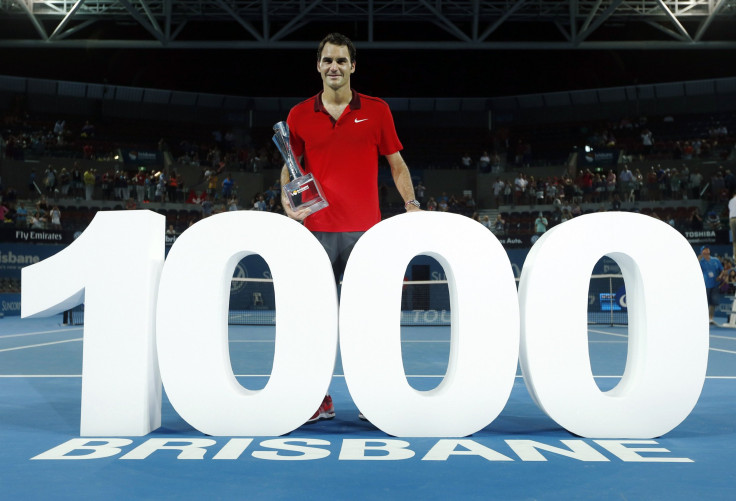Roger Federer News: After 1,000th Win, Can Swiss Legend Capture 18th Grand Slam At 2015 Australian Open?

There was much to savor for Roger Federer after a fine return to form in 2014. However, it appeared the year might have ended with his last great chance to add to his record haul of Grand Slams having gone by the wayside. After losing an agonizingly tight Wimbledon Final to Novak Djokovic, he then succumbed to Marin Cilic in the U.S. Open semifinals, knowing that a drained Kei Nishikori awaited in the final. Yet heading into the first Major of 2015 at the Australian Open, it is Federer, at the age of 33, who is the man in form.
This past weekend, the Swiss reached an extraordinary milestone of 1,000 wins on the ATP World Tour. But more than another celebration of a career that, to many observers, makes him the greatest player to ever pick up a racket, his victory over Milos Raonic to take the title in Brisbane reinforced the feeling that he will be a serious factor to land the big prize in Melbourne. Federer has maintained his confidence about his chances in the event that starts next Monday.
“I do believe that,” Federer said, according to the ATP Tour website. “Then again, it's just talk. In the end, I've got to do the running. I've got to do the clutch play when it matters the most, like tonight… Clearly I do believe I have a shot in Melbourne, otherwise I would go home on Tuesday.”
As well as beating the big-serving Raonic, Federer knocked off another of the sport’s rising stars in Grigor Dimitrov. The Bulgarian, long seen as Federer’s heir-apparent, at least style-wise, was dismissed for the loss of just four games in the semifinals. It could have been a very different story for Federer at his first tournament of 2015. In his opening match, the world No. 2 found himself a set and a break down to the 153-ranked Australian wild card John Millman. But Federer was able to pull off the win, getting some all-important match toughness and further court time under his belt ahead of the Australian Open.
The same was not true for his two great rivals of recent years. World No. 1 Novak Djokovic, after pulling out of the final of an exhibition event through illness, was then defeated in three sets in the quarterfinals of the Qatar Open by veteran big-man Ivo Karlovic. While, after a fine end to 2014 and dominant record in Melbourne prior to his shock defeat to eventual champion Stan Wawrinka last year, Djokovic remains the favorite for the title in the eyes of many, Rafael Nadal’s form makes the Spaniard a long shot. Nadal hardly played in the second half of 2014 due to a series of physical ailments, and he lost his first official match of this year to German qualifier Michael Berrer. Even Nadal has suggested that getting a couple of wins under his belt is the best he can realistically hope for at the Australian Open.
Some eyebrows were raised when Federer took up the opportunity to replace Nadal in the inaugural and lucrative International Tennis Premier League, which, along with his participation in Switzerland’s Davis Cup final win over France, curtailed his off-season. But Federer looks sharper than anyone right now. Still, winning seven best-of-five-sets matches over the course of 14 days poses a mighty test.
He may have 18 Grand Slam titles to his name, four more than closest challengers Nadal and Pete Sampras, but were number 19 to arrive there would be a strong argument for it to be his most impressive of the lot. Should he triumph in Melbourne, Federer would be 10 months older than Andre Agassi when the American won the last of his Grand Slams, aged 32 in 2003, and would put him behind only Martina Navratilova, Andres Gimeno and Ken Rosewall in the list of the oldest Grand Slam winners in the Open Era. Given the physical evolution of tennis since even Agassi’s time, it would be an astonishing accomplishment.
To do so, Federer, a four-time Australian Open winner, would have to correct a record that has seen him knocked out in the semifinals in Melbourne for the past four years. As the second seed for 2015, he will certainly fancy his chances of going at least one better. That is especially true given Nadal’s lack of form and fitness, Andy Murray’s poor recent showings in Grand Slams, and Federer’s dominant record over other leading challengers, like Raonic, Dimitrov and compatriot Stan Wawrinka. It could well come down to a showdown against Djokovic in the final. The Serbian would present a formidable task, but not an insurmountable one given that, despite his heartbreaking Wimbledon loss, Federer won three of the five matches they played last year.
© Copyright IBTimes 2025. All rights reserved.





















